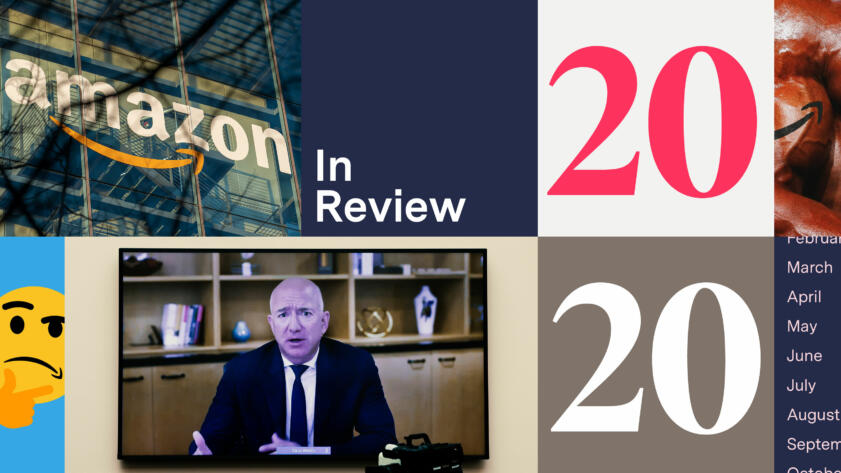This month, Amazon announced that its 2020 holiday shopping season was its biggest ever—and it’s a sign of how much has changed in the past year that that is one of the least stunning statistics about the e-commerce company’s 2020.
The company has long been the dominant e-commerce retailer, but this past year it pushed its ubiquity to new levels. With the pandemic sending many consumers away from physical stores, the company expanded its reach, hiring hundreds of thousands of workers and delivering packages on a never-before-seen scale.
The online buying frenzy, however, came with its own pains for Amazon: criticism over its labor practices and questions about pandemic safety protocols; hoarding and unscrupulous pricing of pandemic supplies by some third-party vendors; questions about the privacy protections of its products; and scrutiny from lawmakers.
Amazon Had Record Expansion
Despite the national unemployment crisis caused by the coronavirus pandemic, this year was still a profitable time to be an Amazon executive, as stock in the company hit a record high of above $3,000 per share. In an April announcement, CEO Jeff Bezos said the company would spend billions of dollars responding to COVID-19 through “expenses getting products to customers and keeping employees safe.” But the company’s third-quarter results for the year made it obvious that Amazon had emerged as a huge financial winner during the pandemic.
$6.3B
Amazon's 2020 third-quarter net income, up from $2.1 billion in the same quarter last year.
Net income for the company rose massively over the same quarter last year, tripling from $2.1 billion to $6.3 billion. Bezos, already the world’s richest person, became the first person in history to top more than $200 billion in wealth, eclipsing Bill Gates by nearly $90 billion, according to Business Insider.
With so many consumers moving to online shopping during the pandemic, a chunk of the money Amazon made went back into expansion, to hire workers to handle the surge of orders. This year alone, the company said, it has hired 400,000 people, with more than 100,000 hired in just the month of October. The company now employs more than one million people.
But How Attractive Are Those Jobs?
While Amazon has pointed to policies like raising minimum pay to $15 per hour for its workers, the company has faced years of criticism over its labor practices—and 2020 was no exception. In September, Reveal reported on internal company documents, finding that Amazon had “deceived the public on rising injury rates among its warehouse workers.”
In a milestone for this year, workers at an Amazon facility in Alabama plan to vote soon on forming the first union at the company, but reports have revealed how the company is attempting to block organizing efforts.
Among other incidents, Amazon used Pinkerton security to monitor workers, according to Vice. This month, meanwhile, the National Labor Relations Board said there was merit to a complaint accusing Amazon of illegally firing a worker protesting warehouse conditions.
A leaked document obtained by Recode also showed the company was building software to track data on unionization and other “threats.” And it wasn’t just Amazon proper: Amazon-owned Whole Foods also reportedly tracked unionization risk through a heat map, ranking the stores most likely to organize.
In a statement emailed to The Markup, Amazon spokesperson Jack Evans said the company employs an “internal investigations team” to protect employees and property, and that it does not allow retaliation for organizing. On injuries, he said, “any incident is one too many,” but that the company is “learning and improving our programs to prevent future incidents.”
Invasive Products and Banned Products
Complaints about Amazon haven’t focused only on labor issues. The company announced a slew of new products this year but faced criticism over the dangers and potential invasiveness of some of those products.
Ring, for example, a security camera company owned by Amazon that has already been slammed for its rules around providing footage to law enforcement, faced more scandals, including recalling cameras over a potential fire hazard, and the announcement of an autonomous Ring drone for homes, called the Always Home Cam, was greeted with alarm over the privacy implications.

Banned Bounty
Amazon’s Enforcement Failures Leave Open a Back Door to Banned Goods—Some Sold and Shipped by Amazon Itself
The online giant bans products related to drugs, spying and weapons, but we found plenty for sale; one of the items bought on the site left a grim trail of overdoses
Amazon also announced Halo, a fitness tracker that attempts to monitor body fat percentage and even the tone of a user’s voice, in the hope that wearers can be more positive and “strengthen communication.” The features led one recent reviewer to describe the device as “incredibly invasive,” with others lodging similar concerns.
In the earliest days of the pandemic, Amazon was also criticized for sellers on its platform exploiting a rush in orders for goods like hand sanitizer. The company said in a blog post published in March that “price gouging has no place in our stores” and that it had removed more than 500,000 offers for violating its COVID-19 price-gouging rules, but one consumer watchdog report found that the practice was still happening in August.
This year, in a series of stories, The Markup also catalogued problems with enforcement on Amazon’s online platform, finding that the company has let the sale of dangerous goods, like weapons and drug paraphernalia, fall through the cracks.
Evans said in the statement to The Markup that “privacy is foundational” for Amazon products, and that the Always Home Cam, for example, can only fly and record in paths prescribed by the user, and has no microphone. He said Amazon voluntarily worked with regulators to help customers avoid installation issues leading to Ring camera fires.
Plus: Antitrust Scrutiny
At the end of this year, U.S. regulators filed antitrust suits against both Google and Facebook, but so far Amazon has escaped some of the legal action directed at other tech giants.
Still, the Justice Department has been conducting a broad inquiry into the practices of online platforms, and some commentators have suggested the recent legal actions also bode ill for Amazon, which could be among those next on the list for antitrust action.
Internationally, the company has faced tighter regulation, including direct antitrust action. Last month, the European Union announced charges claiming that Amazon had illegally used its store of customer data to best smaller competitors.
Evans said in the statement that “large companies are not dominant by definition, and the presumption that success can only be the result of anti-competitive behavior is simply wrong.” Bezos also defended his company in front of Congress this year as part of a U.S. investigation into tech and antitrust.
But a report from Congress issued this year studying monopoly in the tech industry was blistering in its conclusions about Amazon. “The company’s control over and reach across its many business lines enable it to self-preference and disadvantage competitors in ways that undermine free and fair competition,” the report found. “As a result of Amazon’s dominance, other businesses are frequently beholden to Amazon for their success.”





